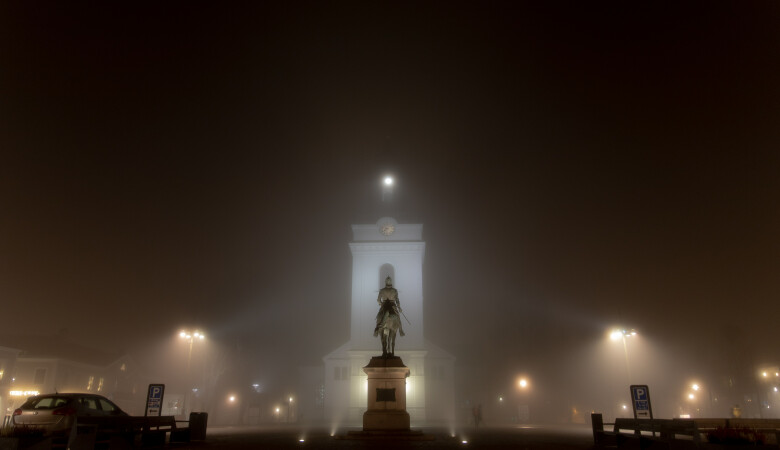The Potter's Freedom (Romans Sermon 69 of 120)
May 22, 2005 | Andy Davis
Romans 9:19-23
Justice of God, Election & Predestination, Providence and Sovereignty of God
Introduction
This morning we are looking this morning at Romans 9:19-23. One of the things my family and I like to do is to go to historic places like Williamsburg or Conner Prairie in Indiana or some of these other places where they do crafts from the colonial era. Some of you enjoy doing that kind of thing too. I like to see the blacksmith make an iron hinge or the gunsmith make a rifle barrel with a long kind of interesting drill. I like to see the joiners making furniture and cabinets. That's really an amazing thing. The tailor sitting cross legged on a table all day long, sewing. I wonder how they do that. It looks like a stiff position, but that's where they are and they're just working. But I especially love to see the potters doing their work, you know what I mean? The skilled potter, who takes some clay out of some container of clay, and then slaps it down on the wheel as it's spinning, and then with just artful fingers he just makes the thing seemingly come to life.
I love that moment where he puts his fingers inside and just pulls up and it just grows right in front of you. Have you seen that before? It's an amazing thing. And out of this lump of clay comes a pitcher or a bowl or something according to his skill and his vision, what it is he's trying to make, it's a marvelous thing. And that is the image that the apostle Paul uses to talk about what God is doing in the world with people. And it's an incredible thing, and we need to understand it in context.
I. A Deep and Confirming Objection
Paul here in Romans 9, is dealing with a very deep and significant question. The question has to do with whether God's Word has failed. And the issue is that the Jews in large number, are, were and still are, rejecting the Gospel of Jesus Christ. And they're not just any people, but they are people that had received great privileges and amazing promises and prophetic warnings and all kinds of things and here they're rejecting Christ. And so Paul is dealing with that.
Now we as Christians, we cherish the promises of God, don't we. And all the incredible things that God has said to us, like in Romans 8, "And we are assured that nothing else in all creation will be able to separate us from the love of God that's in Christ Jesus." Isn't that wonderful. Those are just words. But for me, they're not words. That's the foundation of my hope, that's what gives me joy. I cling to that. But Paul has to take up this problem, if God's Word has failed to the Jews, how do I know it's not going to fail to me? And so, he's dealing with that question. Has the Word of God failed? And he strongly answers it in verse 6 of chapter 9, "It is not as though God's Word has failed, for not all who are descended from Israel are Israel."
And so, he sets up this category, where there are the physical descendants of Israel, the Jews, physically and nationally, but then within that a subset of the true Israel. "Not all who are descended from Israel are Israel." And then he brings us to the mystery of unconditional election. He goes beyond just saying that, he says that God decides who's in each category. And he makes that decision before any of us are born or do anything good or bad. It's the doctrine of unconditional election. The case study was Jacob and Esau. "Before the twins were born or had done anything good or bad, in order that God's purpose in election might stand, not by works but by Him who calls. She was told the older will serve the younger just as it is written. Jacob, I love and Esau I hated." This is the doctrine of unconditional election. In order to deal with that though, up comes the question of God's justice. It seems unjust for God to do this. Unconditional election seems unjust and so he has to raise the question and answer it in verses 14-16.
Is God unjust? And He deals with the issue of, "I will have mercy on whom I have mercy, and I will have compassion on whom I have compassion." It makes an amazing summary statement in verse 16. It does not, therefore, depend on the man who wills, or the man who runs, but on God, who has mercy. It doesn't depend on human will, it doesn't depend on human effort, it depends on God, who has mercy. And then he deals with the negative side as we did the last time, two weeks ago, that we looked at the hardening of Pharaoh's heart and how God doesn't just deal in the lives of the Jacobs but he also deals in the lives of the Esaus. And he deals with the doctrine there of hardening. And the summary then, after dealing with the case of Pharaoh, in verse 18, he sums it all up saying, "Therefore God has mercy on whom He wills to have mercy, and He hardens whom He wills to harden." There it is, in verse 18. And we covered that last time. Now, as Paul frequently does, he raises up an objection to his doctrine.
Now, I've mentioned before he does this because he's a veteran evangelist and apologist, defender of the Christian faith, he's going from place to place in all these synagogues, he has heard this before. "One of you at this point is going to say this to me..." And isn't it refreshing that he does that? I want the doctrine tested, I want the answers that are popping up in my mind to be dealt with. And so he brings up this incredibly deep and I think confirming objection. "One of you will say to me, that why does God still blame us for who resists His will?" That's the objection that Paul is dealing with here in verse 19. Now, what is the objection? Well, the way I understand it is this basically, if God is so all powerful as you're saying, Paul, if everything just comes down to His will. If He can do anything He wants, then why does anybody go to hell, frankly. Why does He blame anybody? For who resists His will? Why doesn't He just save everyone? Has that question ever occurred to you? I know it's occurred to some of you, because you come and talk to me about it. And so, yes, it's on our minds, we're trying to understand it. Why doesn't he just save everybody? If it doesn't depend on the man desires or wills but on God who has mercy, why doesn't He just have universal mercy?
Oh yes, you know the question's in your mind, you have this question. And I remember the first time I read this thinking, "Oh good, I'm going to get an answer. And instead, I get a security alert clearance and I'm not allowed to go in the room. "Who are you oh man to talk back to God?" I'm not cleared for that room, it seems. And yet, amazingly, he goes beyond, and starts to give some of his reasons even past that statement. So it's remarkable what God's doing here in Romans 9, but He's dealing with this objection.
Now, as I look at the objection in my opinion, as I look at it, there's a true aspect to it, and a false one. The objection contains a truth and it also contains a falsehood. What is the truth to the objection? No one can resist the will of God. That is true. God gets what He wants. Some call it the doctrine of irresistible grace. I like effectual grace better. None of us are dragged kicking and screaming to faith in Christ, we run and embrace him don't we? But I look on that as effectual grace, it has an effect on us, effectual grace. So the true aspect is, who resists His will? More on that in a minute. The false aspect is, if God is so sovereign, absolute sovereignty must nullify human responsibility so that there can be no Judgment Day. That is false. Now how those go together, I don't know. And I challenge you to find any human being who does. I can't put it all together. And if you want the removal of mystery you've come to the wrong place, and you're listening to the wrong sermon. I'm not here to remove mystery there is mystery in our faith isn't there? There's limitations to these brains and so there's limit. But truth, I believe God's will is final. The scriptures teach it over and over again. But one of the clearest passages on this, is Isaiah 14:24-27. Don't turn there, but just listen.
There Isaiah is dealing with the problem of the Assyrian empire. And Assyria, a mighty empire, was invading and took over the Northern Kingdom of Israel and was going to come right up to the neck, it says in Isaiah, of taking over Judah as well. But God says, this far, you go and no further and then I'm going to crush you, that's what He says in Isaiah 14 to the Assyrian. Very interesting, but these are the statements that He makes. Isaiah 14:24, "The Lord Almighty has sworn," very strong statement. "The Lord Almighty has sworn, surely as I have planned, so it will be. And as I have purposed, so it will stand." Now, what is that saying? Means, I'm the king. I rule. What I plan stands. I was talking to one of my children about that this morning, I said. "What would you think of a child in a home getting up and telling his or her parents, "Well these are my plans today. I'm going to eat such and such for breakfast, I want to make bacon and eggs and all that, and have some toast, maybe some yogurt. And after I get done, I'm going to go play with the neighbor kids for a while, and then I'll do some of my school work and when I get done with that, I'm not sure what I'd like to do. I would like to spread some mulch on the yard and maybe cut the grass a little bit, and then when I get done... "
He'd stand there in amazement saying, "Excuse me? Well, those are wonderful plans. They're subject to change. Okay, why? Because I'm the daddy. That's why. You don't get to decide, you don't get to choose." So there's an issue of authority. The highest authority however, isn't subject to change. What He plans, it stands. What He purposes that's the way it's going to go. And He says It openly over and over in Scripture. He says later in that same section, Isaiah 14:27, "For the Lord Almighty has purposed and who can thwart Him. His hand is stretched out, and who can turn it back?" Answer, No one.
So that is true. The objection is true. Who resist His will? But the conclusion from the objection is not. That means we're all free, we're all robots, none of us is responsible for the things we do. That. My friends, is not true. We will give an account on the Day of Judgment for every careless word that we have spoken. That is a fact. So the objection is put together in a package of truth and error and we have to try to understand it.
Now in my opinion, this very objection kind of proves the interpretation we've been giving all along in Romans 9, of God's absolute sovereignty in salvation. A free will approach to salvation does not have to answer this question. Somebody would never even think to say, "Well then why does God still find fault for who resists His will in a freewill scheme?" It would never come up. If people make their ultimate choices, then they get the ultimate conclusion of those choices and that's it. But here, this objection proves we are dealing with absolute sovereignty, aren't we?
As if the open texts weren't enough that openly say it, he raises this question. Now, as I look at this, I see basically, four parts to the answer. And it's just amazing how they all begin with R, isn't it amazing when that happens? But I tell you this, I like alliteration, but I don't ever want to force a text under certain letter schemes. Certain letters are better than others. Q is really bad. I've never been able to do Q but R is good. And in this case, I think it does lay out the text, pretty well for us. First, we're going to see God's Rebuke. Second, we're going to see God's Role. Third, God's Rights. And fourth, but not really this week, probably more like next week, God willing, we'll see God's Reason for all of this. Okay?
II. God’s Rebuke
First, God's Rebuke. Basically, this begins with God putting humanity in its place. We are put in our place here. Look at verse 20. "But who are you, Oh man, to talk back to God?" This is a rebuke. "Shall what is formed say to Him who formed it, Why did you make me like this?" The focus here is on our weakness, our frailty as created beings, our mortality. The human race has forgotten itself and it's wisdom to know who we are, isn't it? So, as we deal with the issue of God's sovereignty in salvation, it's good for us to have an attitude check at a certain point. We are, uppity. Is that a good word? We're uppity. Human beings are uppity. We don't stay in the place that God created us for. There's an upward mobility in the spiritual realm, just like the devil when he said, "I will ascend to the most high, I'll sit on God's throne." We have that in us, and so we don't stay in our place, we are uppity. And so therefore, it's good for us to be humbled, to be quieted at a certain point. Because we misunderstand our relationship with God as a result. And so there are some things that God has designed to humble us. For example, in Psalm 8:3-4, David said, "When I consider your heavens, the work of your fingers. The moon and the stars, which you have set in place, you know what I think? I think what am I? What is man, that you are mindful of him, the son of man that you care for him?"
Now, that's humbling. A nice walk under a star strewn sky, that'll do it. Or look at a mountain range, that will put you in your place. Look at the ocean as it's raging on a stormy night, that'll put you in your place. And then there's just theology. Just as you read scripture. In Ecclesiastes 5:2 it says, "Do not be quick with your mouth, do not be hasty in your heart to utter anything before God. God is in heaven and you, you're on earth. So let your words be few." There's a humbling there. I actually think that Isaiah 40 through 49, those 10 chapters, are written to humble us so that we remember that, "He sits enthroned above the circle of the Earth, and its people are like grasshoppers in front of Him. All the nations are like a drop in the bucket, he weighs them like they're dust on the scale." Does that not put you and me in our place? It does. And so therefore, God wants to humble us. But one of the number one things that God does to the people that He loves is He begins by humbling them. I already talked to you about Moses. "Stop, don't come any closer. Take off your sandals." And Moses is trembling on the ground. He can't even look, he's so fearful.
God did that to Abraham in Genesis 15 when He was going to appear to him and confirm the covenant. A thick and dreadful darkness came over Abraham and he was afraid. It was a fear. He did that with Isaiah when Isaiah saw a vision of Christ seated on His throne and the train of His robe filled the temple, and there were Seraphs, each with six wings and they were calling to one another, Holy, Holy, Holy is the Lord Almighty. And the door posts and thresholds shook with the voice of the angels. And Isaiah says, reasonably, I think, "Woe is me. I'm a sinner." He means to humble Isaiah there. He meant to humble the Israelites at Mount Sinai with that display of power when He came down in a cloud, and there was lightning, and thunder, and there was a loud voice and a trumpet and the whole ground under their feet shook. And the people were terrified. Don't tell me God wasn't trying for fear there. He was.
He was trying to bring the fear of God in the hearts of people. And it worked, because they said, as God began to speak to them, they begged to not hear His voice anymore, and God said, "It's a good thing. Oh, that they would always fear me and obey my commands." So God does mean to humble us and He means to keep us in our place. Why? For our own good, because it is reality. He is God and we are not. He sits on the throne and we will not, except in that we sit on Christ's throne through redemption. But He is God. And so we need to be humbled. Therefore we have to have the right attitude.
Martin Lloyd Jones put it this ways so beautifully. Talking about this whole difficult chapter of Romans 9, he says this,
“You cannot understand? You are tempted to question and to argue, and to query? The reply to you is, ‘Who are you, O man, that replies against God! Shall the thing formed say to Him that formed it, why have you made me like this?’ ‘But that,’ you may say, ‘is not a fair argument. It is rather a prohibition of argument, and the exertion of an unfair authority.’ To which I reply that we were never meant to argue with God, and that we should never have started from the assumption that it was to be a discussion between two equal disputants. God is in heaven, and we are upon the earth. God is holy and we are sinful. God knows all things, and sees the end from the beginning.... God needs no defense, for He is on the throne. He is the Judge of all the earth. His Kingdom is without end. Cease to question and to argue! Bow down before Him! Worship Him! Get into the right attitude yourself, and you will begin to understand His actions.”
Lloyd Jones is right. And that's all that happens today in this sermon, is that you feel a humbling in a downward direction, like it says in Psalm 95. "Come let us worship and bow down. Let us kneel before the Lord, our God, our Maker. For He is our God and we are His people, the sheep of His pasture." Oh, that's a good thing, isn't it, to be humbled. There's a sweet feeling that comes from that.
Now, the issue here is, is God on trial? Is he needing to answer our cross examination? Are we the district attorney pacing back and forth and thinking of our next question, as we orchestrate this debate with God and make Him dance to our logical tune? Is that what's going on here? "Enough." says Romans 9. Stop. Remember, who you are. Remember who you're speaking to. Think. You're dust, created, and if you're a Christian, you're a vessel fitted for glory by His power. That's marvelous.
But we are not in any position to talk back to God. The word means here, doesn't mean ask an honest question. That's not what we're talking about here. Doesn't mean, I have a question I really would like to know. I'm trying to understand, that's all fine. I lack wisdom, James says He gives honestly, and generously out without rebuke. He's not going to rebuke you for asking for wisdom. But that's not what this verse is talking about. Here we're talking about answering back or arguing back, or in the parental child relationship, talking back you know. There's the back talking and that is cut off here. We are not to talk back to God. This is, I think a rebuke that refreshes us. It doesn't sting, it actually heals us, friends. It heals us. It's a good thing to be in our place, because the place that God made is good. And so after God had rebuked Job, Job repented in sackcloth and ashes. He said his disputations with God, were over forever. You're not going to argue anymore.
And so it says in Job 40, "The Lord said to Job. Will the one who contends with the Almighty correct Him? Let him who accuses God answer him." And then Job answered the Lord. "I am unworthy. How can I reply to you? I put my hand over my mouth. I spoke once but have no answer. Twice but I will say no more." Job said, I don't have anything else to say. I've seen the Lord and He has quieted me. And so friends, let's start with the rebuke. "Who are you oh man to argue against God?" Let's not argue anymore.
III. God’s Role
The second is God's role. God is the potter and we are the clay. I love that song. Wasn't that beautiful? I mean it's delightful, the sense of God at work in our lives, is one of the most encouraging ones you'll ever find in your life. And to know that God is wise about what He's doing in your life, His hands are on the events of your life, nothing comes to you except through His fingers, and He's wise, He is the potter we are the clay. It's such a beautiful thought.
And it is all true for us as Christians as you listen to all the words of the song. It's true. But I think Paul is using it differently here in Romans 9, a little bit. The thought itself is the same, but he's dealing here with vessels of mercy, and vessels of wrath and what God is doing there. And here it says, "God is the potter and we are the clay." It says, "Shall what is formed," verse 20, "say to Him who formed it, 'Why did you make me like this?'" The Greek word is plasma from which we get the word plastic, and all that. There's a sense of something moldable, shapeable, you can work with it. We're being molded and shaped, and fashioned. The point is essentially our changeability. We are moldable, we are changeable. Every day then, we are shaped and molded and changed in some way. By things we read, by conversations we have with people, by experiences that we have out in the world. All of those things mold us, shape us, affect us. Christian, non-christian everybody, all over the world. That's what it is we are moldable, we are shapeable.
The contrast is God, He never changes, never. Nothing molds and shapes God. God isn't progressing, He's not improving, He's not getting worse either. He is the same yesterday, and today and forever, always. God is fashioning us after His own purpose. He is working on us by His own internal vision. Many testimonies of people, craftsmen and artists talk about the artistic process. One French artist was talking this way, he said, "A rock pile ceases to be a rock pile the moment a single man contemplates it, bearing within him, the image of a cathedral." It was a rock pile, it could eventually, 128 years later be a cathedral. But there's a vision. The artist working. Michael Angelo was talking about one of the angels that he carved out of marble and he said, "Well, I saw the angel in the marble and carved until I set him free." Isn't that marvelous.
Another time, Michael Angelo was asked while he was sculpting his David, "How do you know what to carve away?" His response was reported to be, "I simply remove everything that doesn't look like David." See there it is, you know. Sculpting in one easy step. I don't know how he gets the veins and tendons and how it looks like it's actually skin on the marble, that's amazing that he was gifted. But that's what... He's got an internal vision and he works with the block of marble until it is the way he saw. That is what God is doing in the world. God, God, God's medium, is people. That's what He's working in. Michelangelo worked with marble there making that statue. Others work with canvas, and oil-based paints. God works with people. He is the potter and we are the clay. We're moldable.
And what is He doing in the elect? What's He doing in we who believe in Jesus Christ? Well, it says in Romans 8:29, "Those God foreknew, He predestined to be conformed to the image of His Son, that He, Christ, might be the first born among many brothers." So God's internal vision is his own Son, our Lord and Savior, Jesus Christ. And what is he doing? Well, basically, I take everything out of him or her that doesn't look like Jesus. That's it, that's sanctification, that's the work that He's doing. He's fitting us for glory. More about that God willing next week. But he is the potter and we're the clay.
Look at verses 20-21. "Shall what is formed say to him who formed it, Why did you make me like this? Does not the potter have the right to make out of the same lump of clay some pottery for noble purposes, and some for common use?" Now, pottery is an ancient art, it's been around for a long, long time. Ancient, ancient art. The potter and the clay is a strong image from Old Testament days. The human race, Adam originally came out of the dirt. And God, in an amazing way, shaped out of clay Adam's body. It says in 1 Corinthians 15:47, "The first man is from the earth." He's earthy. That's us. Okay, but then the prophets especially Isaiah, have the image of the potter and the clay for example, Isaiah 29, "Woe to those who go to great depths to hide their plans from the Lord, who do their work in darkness and think who sees us? Who will know?You turn things upside down. As if the potter were thought to be like the clay. "Shall what is formed say to Him who formed it, 'He did not make me.' Can the pot say to the potter, 'He knows nothing.'" But that's what a sinner does.
The pot, (we) say of the potter, he doesn't know anything. Similarly, in Isaiah 45, it says, "Woe to him who quarrels with his maker. To him who is but a potsherd among the potsherds on the ground." The image is the same. And then in Isaiah 64:8, "Yet O Lord, You are our Father, we are the clay You are the potter. We are all the work of your hand." But the best is in Jeremiah 18. "This is the word that came to Jeremiah from the Lord." So the Word of the Lord is coming to Jeremiah, but not there. He says, "Go down to the potter's house, and there I will give you my message. So I went down to the potter's house, and I saw him working at the wheel. But the pot he was shaping from the clay was marred in his hands, so the potter formed it into another pot, shaping it as seemed best to him. Then the word of the Lord came to me."
So first, he is watching this thing. What does this have to do with anything? And then the Word of the Lord came and this is what it was, "O House of Israel, can I not do with you, as this potter does, declares the Lord. Like clay in the hand of the potter, so are you in my hand, O House of Israel." Don't I have the right to do this? That's what the potter did with his pot, he reshaped it, he remolded it, he did something different with it. And you didn't cry out an objection, you didn't say, "That's unjust what you're doing there." Of course, he's the potter, that's his clay. He can do that. Now, I want to make a key distinction and I think this will be essential to you understanding Romans 9. Martin Lloyd Jones makes this point, and I think he's right. "We are not dealing here with original creation, God originally making man. I don't think so. Rather, we're dealing with man, the human race, as sinful after the fall."
That's an important distinction to make. God did not create Adam evil, He created him good. He gave Adam a will and put him in the garden and tested him. Adam chose to sin. In him, the entire human race sinned and became corrupt, all of us. That's the doctrine of original sin. As soon as each individual human being has the opportunity to choose and to obey or disobey the law of God, we sin, all of us. When the commandment came, sin sprang to life and I died. And so we sin as a result of being in Adam, but also from actual choices, as well. The whole human race then, is the massive lump of sinful clay. Not shaped or made sinful by God for God cannot make any one evil. It says in James 1:13, "When tempted no one should say, God is tempting me, for God cannot be tempted by evil nor does He tempt anyone."
Lloyd Jones put it this way.
"This is essentially different from the original creation, because in the original creation it was not only creation from nothing, but still more important, God created man in His own image and likeness.’ That is the opposite of dishonor. He looked upon man, as He looked upon the whole of creation, and we are told that He saw that it was good. God never created anything unto dishonor, but here we are dealing with a potter who makes one vessel unto dishonor. And that proves we cannot be dealing with human nature as such, still less with man as he was made at the beginning. It is an account of what God does with fallen humanity.
So there is the key to the whole explanation of this statement that has mystified so many people. They get hold of the idea that God has deliberately made some people that they might go to hell. That is a lie! It is not taught anywhere in the Scripture... The lump of clay is not 'humanity'; it is 'fallen humanity.'"
It is as though God found this disgusting pile of rejected stinking clay good for nothing, and chose to do something with some of it. He chose to take some of that lump that defiled and evil pile of useless clay, and fashioned it into the perfect image of His Son. But he did more than that, the rest He gave over to the natural proclivities of their heart hardening them as vessels of wrath. He gave them over to what they wanted to be. He could have saved them all, he could have exerted His sovereign power in an awesome way. He could have transformed them all, but He chose not to. Why? We'll talk about that next week. I told you already, I'm not going to remove all the mystery, but we will discuss it more. His reasons, next week. But here is God a molder and shaper of unregenerate people, and a hardener and judge of unregenerate reprobate people. The key insight here then is that God does not fashion and shape every one for glory. Some are crafted as vessels of honor, some are hardened as vessels of dishonor. Some are vessels of wrath prepared for destruction, others are vessels of mercy, whom He prepared in advance for glory.
IV. God’s Rights
A final point I want to make today is God's rights. Verse 21. "Does not the potter have the right to make out of the same lump of clay some pottery for noble purposes, and some for common use?" God has a right of ownership here. The potter/clay analogy is one of sovereign rights of ownership and craftsmanship. God owns the clay. He can make anything He wants out of it. The Greek word here is 'exousia,' power, authority. Not so much like the dynamite power that we get later in verse 22. "What if God, choosing to show His wrath and make His power known, [like dynamite] bore with great patience the objects of His wrath." Here it's rather authority, God has the authority to do this. He has the right to do it, He's the king, He's the owner, He owns all things. God can do what He wants with what He's made. And you live by this, don't you? Suppose the government came without due process of law and confiscated your house. Would you not feel a sense of injustice? Oh yes, you would. And so also in all the other areas of your property. Communism was an utter failure because it violated this basic principle of rights of ownership. Without due process of law, things were confiscated and put into a big collective pot. But God here declares His rights over the whole human race.
Now when we deal with this issue of the same lump of clay, this is remarkable, and it is humbling. Basically, God doesn't find a pocket of the rejected clay and say, "Oh here's something I can work with. Well, here's some good clay. Just, right there and pull out some good clay and work with it. And those are the Christians. No, it's the same lump folks. The same lump, as those that are going to hell. Does that not humble us? Does it not teach that there's no difference between us and them? Out of the same lump of clay God has power to do this. And what is He doing in us? Well, He's making us a vessel of honor, and I want to end with that. God is working in the believers, that we would be containers or vessels of glory. That we would have the delight and the glory of the knowledge of God inside of us. That we would hear that voice saying, "Come up here and I will show you my glory." And that we will see it. We're being fitted and prepared for glory. And if you're a child of God, no matter what is going on in your life, no matter what suffering, no matter what struggles and temptations you're fighting, you are being fitted and prepared for glory. You are being prepared in advance for honor. And oh is that so encouraging and so sweet.
Next week, I want to talk about God's reason for all of this.
V. Application
Application. First, humbly ask God, humbly ask God for the proper attitude. Say, "Lord, you know I've had the tendency to argue against doctrine. I've had the tendency to reject the doctrine of your sovereignty. Will you please humble me? Like You did Job. Well, maybe not exactly like you did Job. But do a humbling work in me. I'm not asking for all of that. But humble me Lord. Do what you need to do in me to make me humble before You. To accept anything You say. Also Lord, I want to confess a sin of arrogance that I have fought against the doctrine, fought against Scripture. I want to just accept what your Word teaches." Christians, will you praise God for His incredible skill. He is working on you, right now, He's working on you. He's going to be working on you all this upcoming week. He is feeding you and preparing you for glory. And is that not a marvelous thought? Does it not take some of the sting out of the trial that you're going through? And unbelievers, if you're here and you've never trusted in Christ, He could fit you for glory too. He has the power to transform anybody's life. Come to Christ, trust in Him, believe in Him for the salvation of your soul. Close with me in prayer.






























